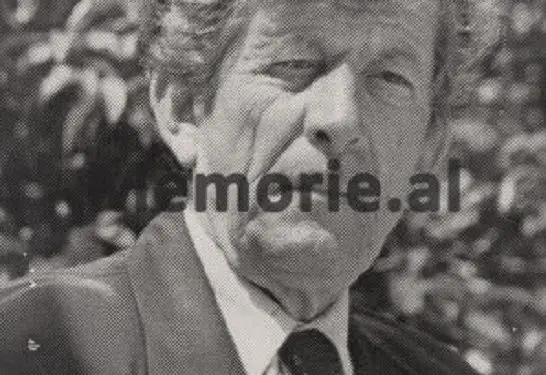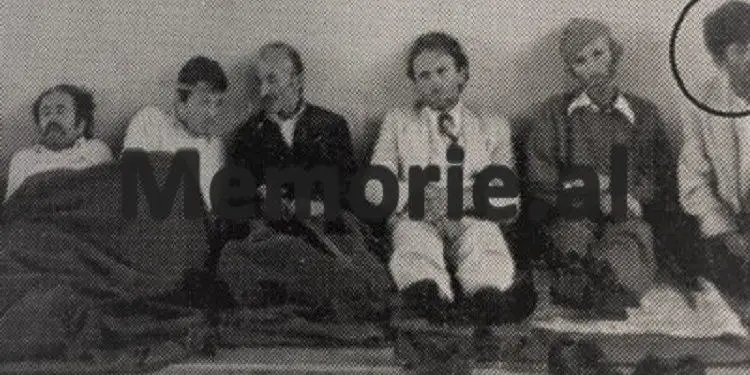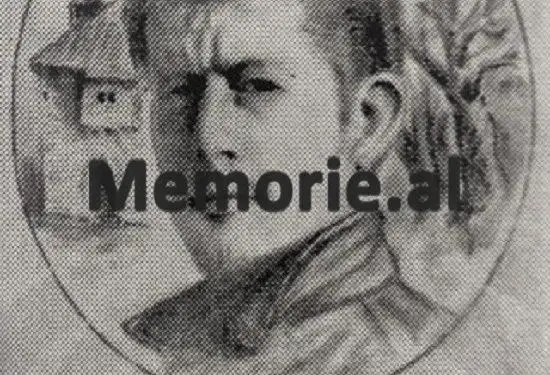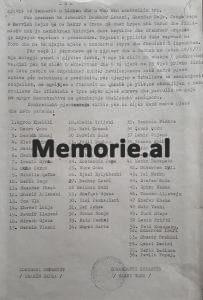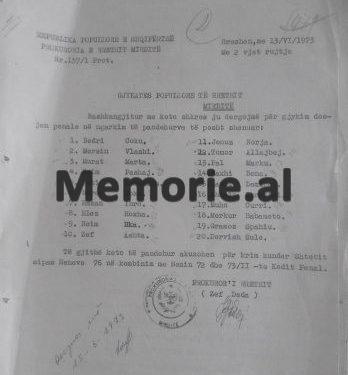Dashnor Kaloçi
Memorie.al publishes the unknown story of Mersin Vlash, originally from the village of Lis i Burrel and raised in the Orphanage, who in 1953, while attending the Pedagogical School in Elbasan, mistyped the slogan “Long live the Central Committee”, which caused he was not allowed to attend high school, but was sent as a soldier to Pogradec, where he was sentenced to ten years in prison for attempted escape. Mersin Calvary in the camps, prisons of Enver Hoxha’s communist regime, where he was re-convicted in the Spaç Revolt, in 1973 for painting the starless eagle on the national flag, which led to his being sent to prison Burrel’s horror, where he was re-convicted again and could only be released in February 1991.
“In 1973, I took part in the revolt of the prisoners of Spaç and there I painted the eagle on the flag, which was raised on the terrace of the building of our silos. After that revolt was suppressed, along with many others who were its organizers, I was arrested and taken to court, where I was sentenced to another ten years. “Before the court, I declared that I was the only Albanian who was sentenced to imprisonment, because I had painted the eagle without a star, on the National flag.” Mersin Vlashi confesses to his re-sentence in the Spaç Revolt, in 1974, which made him suffer 32 years in the prisons of the communist regime of Enver Hoxha, being the only Albanian who was sentenced to political prison, only why he had painted the starless eagle on the flag.
From Lisi, to the Orphanage
Mersini was born in the village of Lis i Matit in 1938, to a not very well-known peasant family, as her ancestors were not involved in wars and politics and state affairs. After the death of his father in 1943, his family was further impoverished. As if the loss of his father was not enough, a short time later, Mersin’s mother, who was trying to raise her three orphaned children, had an accident in which she lost one of her legs. Regarding that event and the circumstances in which it happened after the mother’s accident, Mersini recalled: “In those conditions, the mother could not hold us and from the beginning of 1946, me along with three other children from my area, who were orphaned, brought to the Orphanage in Tirana, where we were treated very well, as that house regularly supplied them with food and clothing, UNRRA.After finishing primary school in Tirana, I was sent to the “Tom Kola” dormitory in Shkodra, where I attended the school “Vasil Shanto”. 1957, I graduated; I could not go to high school, although I insisted.
Wrong banner and first prison
Regarding that distant event, Mersin recalled: “Because I had a passion for painting and design, I was assigned to write a slogan in the city, a Soviet delegation was expected to come. Instead of writing ‘Long live the Central Committee, I mistyped,’ long live the Central Committee. For this they made trouble to me, telling me that I had done it on purpose, which was not at all true. So after finishing Pedagogy, they did not give me high school, but in November 1957, I was sent as a soldier to Pogradec. “Mersini did not fully confirm that from that event, he could not go to high school, but neither they did not deny it… ?! “When I went as a soldier, I had the idea to escape from Albania, although my dissatisfaction with the communist system had arisen before. I discussed the idea of escape with a fellow soldier. He talked to two of his Tirana friends E. Bërxolli and Mr. Fortuzi. They both reported me to the ward operative M. Vito, who arrested us together with my friend, on April 23, 1958. After they kept me for six months in the dungeons of the Korça Internal Branch, where I did not accept anything. , a military trial presided over by Colonel Mithat Goskova, sentenced me to ten years in prison. After my sentence, I was sent to the Thumana camp, where we worked with hundreds of other convicts to drain the swamp. In that camp, where I stayed for seven years, I met Asllan Allaman and Ali Çollaku, who were from large families of Mat, of Zogist origin. “In that social circle, who were sympathizers of the Bird Monarchy, I was formed and created convictions as a nationalist.”
Arrest and second prison
In 1965, after serving seven years in prison, Mersin Vlashi was released and returned to his native village, Lis i Matit. In that mountainous country, he had no livelihood, so he was forced to move to the new town of Laç, which had been laying its foundations for three or four years. Regarding that time, Mersini recalled: “After two years in Laç, in September 1966, the Burrel Internal Branch issued an arrest warrant for me. The charges against me were:” agitation and propaganda and attempted escape. “of the Burrel Branch, F. Kraja and investigator V. Plaku, tortured me and left me naked in the middle of winter In February 1967, I was taken to an “exemplary” trial in the town of Burrel, with prosecutor R There I said to the court: ‘I have never done agitation and propaganda, against the communist regime, but since you insist on such a thing, I am telling you now here in the courtroom, to hear it with your own ears. And there in that hall, I left nothing unsaid against the communist regime of Enver Hoxha. After my words, they sentenced me to a maximum of ten years in political prison. I started my second prison in the city of Elbasan and a year later, in April 1968, when the Spaç prison was first opened, I was immediately sent to as”
New sentence in the Spaç Revolt
Mersin remained in Spaç prison until 1979, when he was transferred to Burrel Prison, where the most dangerous persons and potential opponents of the communist regime were held. “In the Spaç camp where I was serving my sentence, I took part in the prisoner revolt, which took place in May 1973, where I painted the starless eagle, on the National flag that was raised on the terrace of our silos. That revolt, though was organized as a protest against the bad conditions, it had a strong political character, because in a way we kept alive the anti-communist resistance, for which hundreds of Albanian nationalists had given their lives: Sami Dangëllia, Luan Burimi, Demir Pojani, Luan Koka , Bedri Çoku, Dervish Bejko, Paulin Vata, Hodo Sokoli, Nuri Stepa, Koço Papa, Gëzim Çela, and others, were the main organizers of that revolt. I was sentenced to political prison because I had painted the starless eagle on the National flag, and in that trial I was sentenced to another ten years in prison. , as my family was extremely poor. Only my elderly mother, with one foot, would ever come there to bring me some basket of grapes. “I was held in that camp until 1979 and then transferred to Burrell Prison.”
Fourth sentence in Burrel
After twelve years in Spaç prison, in May 1979, Mersin Vlash was sent to the famous Burrel prison, where, as he recalls, the then director Idajet Deda told the prisoners who went there: “Here i say Burrel, who enters and does not leave. ” Regarding the long years, in the famous Burrel prison, Mersin Vlashi recalled: “Burrel, although considered the hell of the prisons of the communist regime, of Enver Hoxha, was preferred by many of the intellectual prisoners, as there they escaped work During the 12 years of my stay in that prison, I had the opportunity to stay in a cell with many people, where I want to single out: Abdulla Sallaku, Avni Alikon, Shik Stërmasin, Pjetër Arbnori, Bedri Çokun, Luan Burimin, Kapllan Resulin, Spartak Ngjela, Sherif Allamani, Bedri Blloshmi, Qani Sadiku and others, with whom we talked all the time against the communist government. that communism would end one day and not only for us, but also for all the Albanian people, the hour of freedom would come.With no financial help from the family during those years, I painted portraits of friends and various postcards, that a to send them on holiday occasions to their relatives. From this work I was doing, I was extracting some money, or a pack of cigarettes. In Burrell Prison, I was arrested and sentenced for the fourth time, adding another ten years to prison, on charges of agitation and propaganda. At the time I was serving my sentence in Burrel’s cells, I remember that Generals Gjin Marku and Vaskë Gjino and another member of the large Vrion family died there. “I was only able to get out of that prison in February 1991, when new political developments began and the communist regime was shaking its foundations.”
Director of Burrell Prison after the ’90s
In 1995, Mersin Vlash was told he had been appointed Director of Burrell Prison, where he had had the “fortune” to spend 12 years of his life. In this regard, Mersin recalled: “Although it was a unique case, perhaps in the whole world, for a former prisoner to be appointed director of a prison, where he had previously served a sentence, I immediately accepted that task, because that post, not There was nothing like the directors of that prison, during the communist regime, during which time I did not feel like a director, but equal to all prisoners, and I tried my best to alleviate their suffering. although they were convicted of ordinary crimes.Although I accepted that duty with full conscience, I was against the reopening of Burrell Prison, that prison should remain as a museum because it was a symbol of the fortress of anti-communist resistance, since 1946 and until 1991 “/Memorie.al




